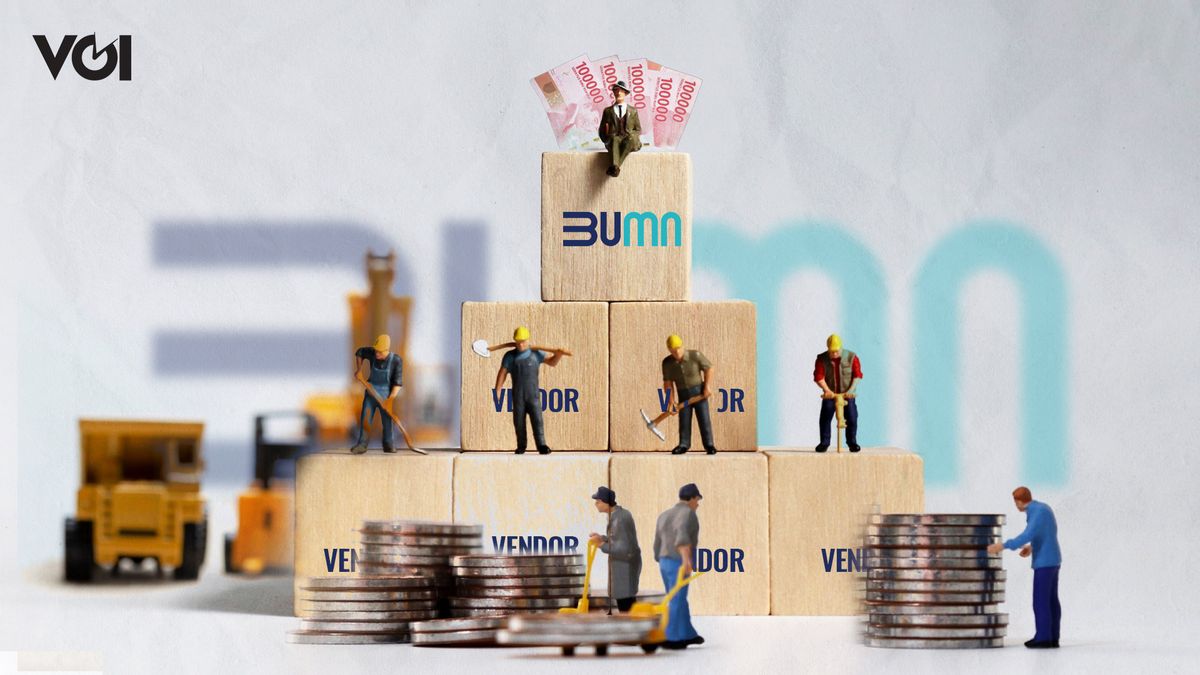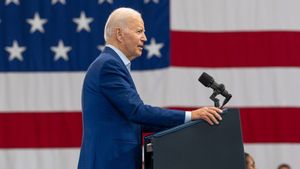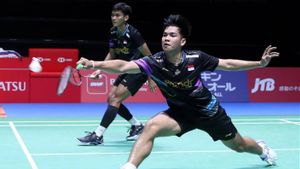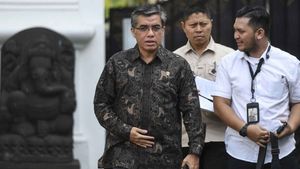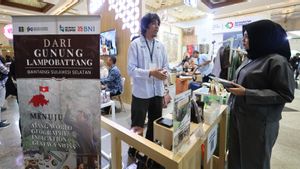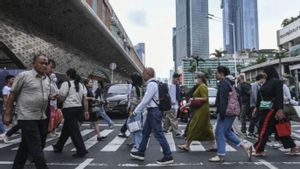Jakarta - The sad story of vendors who have partnered with State-Owned Enterprises (BUMN) Karya seems to continue. Many of them are currently in debt and even go bankrupt due to late payments.
Usually, payments to vendors are made based on the physical progress that has been made. There are three general payment terms. First, collection during physical development reaches 50 percent with a payment of 30 percent of the contract value.
The second term, if it has reached 80 percent, will be paid 50 percent, and the last term when the project is completed. However, vendors often only receive payments of 80 percent of the contract value. While the remaining twenty percent is usually detained on the grounds that the results of the work are retention.
Recently, on social media (formerly Twitter), a video recording circulated related to one of the BUMN Karya members, namely PT Waskita Karya, which many vendors have not received payments. This recording was uploaded by Ronald Sinaga's @brorondm account and tells about a vendor who has received payments. However, the vendor owner also received a message not to make a fuss.
The message was ignored, and the vendor owner continued to publish this issue so that other vendors also get paid. "When will other vendors be paid? It's not just me who has to be paid. They think that I'm just fighting for myself, but other vendors also have to make payments," said the vendor.
The vendor owner revealed the reason for keeping talking in public even though he was asked to remain silent. He was worried that there were still many other vendors who were victims of BUMN Karya. He explained that payments by PT Waskita Karya even those that were not yet due were also processed after he revealed this issue to the public.
The account owner, Ronald Sinaga, also pays attention to the problem of PT Waskita Karya's default. What worries me is that they actually get new contracts and projects from the Ministry of PUPR for the access toll road construction project to Patimban, West Java.
PT Waskita Karya's Losses Rise Drastically
Meanwhile, PT Waskita Karya Tbk, one of the state-owned works listed on the Indonesia Stock Exchange with the stock code WSKT, faces serious challenges. Despite having the responsibility to build government infrastructure projects, this company is experiencing financial difficulties caused by high debt burdens.
In the first half of the financial report, WSKT recorded a drastic increase in net losses of up to 776 percent, reaching Rp2.07 trillion compared to the first half of 2022, when the net loss was still around Rp236.51 billion.
In addition, the company's total liabilities also increased to IDR 84.31 trillion, an increase of around 9.20 percent compared to the same period in 2022, which previously reached IDR 77.2 trillion. PT Waskita Karya has submitted an application to get capital injections from the government through the State Investment (PMN) scheme of IDR 3 trillion, but this application was rejected.
Problems related to PT Waskita Karya emerged in February 2023. At that time, this company was faced with a lawsuit on the Suspension of Debt Payment Obligations (PKPU) by two vendors involved in several development projects. In early January, CV Bandar Agung Abadi filed a PKPU lawsuit at the Central Jakarta District Court (PN) because the construction company had not paid off a debt of Rp. 2.03 billion related to the Kayu Agung - Palembang - Betung Toll Road project package II Section I.
When this problem has not been resolved, PT Waskita Karya is again faced with a PKPU lawsuit filed by PT Megah Bangun Baja Semesta to the Central Jakarta District Court. This lawsuit arose because the company had not paid off a debt of Rp. 2.93 billion. PT Megah Bangun Baja Semesta is one of the vendors involved in the Minangkabau International Airport Terminal construction project, Depati Amir Phase I Airport Terminal, and Waskita Rajawali Tower Renovation.
Deputy Minister of SOEs II, Kartika Wirjoatmodjo admitted that PT Waskita Karya had caused losses to a number of vendors. Although it did not specify the number of vendors affected, Tiko - his nickname - stated that the Ministry of SOEs continues to find the best payment scheme so that PT Waskita Karya can fulfill its obligations to vendors, as well as pay debts in the form of bonds and bank loans.
"We have carefully considered this, including what percentage we have to improve in this situation. We calculate banking obligations, bond obligations, and obligations to vendors," he explained in a written statement, Tuesday (20/6).
The Fate Of The Vendor Partner Of PT Istaka Karya
The bad luck of the partner vendors is also not only limited to PT Waskita Karya, but also felt by vendors partnering with PT Istaka Karya. Bambang Susilo, Chairman of the People's Association of Victims of BUMN Istaka Karya (Perkobik), shared his experience that in 2019, he worked as a subcontractor for the stone and sand supplier for the Kentungan Underpass project, Yogyakarta, which was carried out by PT Istaka Karya. However, until now, payments for his work have not been received.
It has been four years since, and Bambang still has not received payment from Istaka, who has not arrived. In the end, Bambang realized that he was not the only one experiencing this unfortunate fate. His friends at Perkobik are also facing a worse situation, waiting for payments for their rights for decades that have not been fulfilled.
SEE ALSO:
Bambang revealed that several projects were being debated by vendors, such as the construction of the Sedyatmo Cengkareng Toll Road at Km 26 and Km 27 in 2008, which then started operating in 2010. This project was carried out by three companies: KADI International, PT Pembangunan Perumahan, and PT Istaka Karya.
In addition, there is the 73 km section I Semarang-Ungaran Ungaran Ungaran Ungaran Toll Road project which started in early 2009 and has been operating since 11 November 2011. The contractors for this project are PT Istaka Karya, PT Adhi Karya, and PT Waskita Karya.
At that time, Istaka's finances were known to be in a difficult situation. Their debt accumulated up to hundreds of billions of rupiah, so that the construction of the Semarang-Ungaran Section I Toll Road was disrupted. In fact, one of the vendors or subcontractors, namely PT Bumi Sentosa Dwi Agung (BSDA), had blocked the toll entrance as a form of protest because their rights had not been paid. At that time, not many vendors dared to speak up and prefer to be patient.
In 2011, the Supreme Court stated that Istaka was bankrupt because she was unable to pay a debt of 7.6 million US dollars or around Rp144 billion. Istaka suffered a loss of Rp275 billion, had negative equity of Rp656 billion, and experienced a lack of liquidity and financial support.
At the same end of the year, Istaka's management offered a peace agreement (homologation) to vendors through a joint voting process. Through this process, the company managed to avoid bankruptcy.
However, vendors cast doubt on the company's good intentions in achieving peace, and they consider the peace to be only used by Istaka as a way to extend the payment time. According to Bambang, Istaka has a debt to 160 vendors with a total value of Rp350 billion.
Debt Payment Prioritized To Directors And Employees
The management of PT Istaka Karya, called Bambang, has promised to pay debts to vendors in the form of shares, with the number of shares to be given depending on the amount of debt of each vendor. In addition to the stock conversion option, management also offers to reschedule payments, cut interest, and fines.
However, during the verification meeting, PT Istaka Karya reported a total debt of IDR 753 billion, consisting of a concurrent creditor debt of IDR 300 billion, a separatist creditor debt of IDR 400 billion, and a debt to employees of IDR 53 billion.
Bambang, revealed that the main problem lies in the lack of assets owned by Istaka Karys, where the total debt reaches 4-5 times the value of its assets. Payment priorities are actually given to employees and company directors, so vendors will most likely not get a share of the payment.
The decision regarding the conversion of shares to Istaka Karya creditors is based on the Decision of the Ratification of Peace (Homologation) Number 23/PKPU/2012/PN.NIAGA.JKT.PST. dated January 22, 2013 and an independent auditor report for the 2012 financial year.
In an effort to find capital between 2013 and 2017, the management of Istaka Karya received the assignment of state projects. In 2018, President Joko Widodo (Jokowi) restructured Istaka Karya by injecting state capital through the issuance of unpublished shares. On September 17, 2018, President Jokowi ratified Government Regulation Number 44 of 2018 concerning Changes in the Structure of State Share Ownership through the Issuance of New Shares in the Company PT Istaka Karya.
However, even though PP 44/2018 has been issued, vendors still have not received their shares. In fact, their position is increasingly difficult because the share portion owned by creditors is temporary, and the government plans to buy back the shares in accordance with regulations after nine years. In addition, vendors are not given the right to dividends or voting rights at the general meeting of shareholders (GMS).
In 2020, SOE Minister Erick Thohir assigned PT Asset Management Company (PPA) through a Special Power Letter (SKK) to cure a number of SOEs experiencing financial problems, including PT Istaka Karya. PPA acts as a strategic instrument for the government in increasing the value of SOEs through restructuring, revitalization, managing the risk of problematic credit, and special funds for special situations (special situation situation, SSF).
PT Istaka Karya Bankruptized
PT Istaka Karya, which is experiencing financial problems, eroded assets, and accumulated debt, has caught the attention of PT Perusahaan Pengelola Asset (PPA). Efforts to deal with this situation include transferring Istaka Karya employees to PT Nindya Karya. However, according to Bambang Susilo, Chairman of the People's Association for Victims of BUMN Istaka Karya (Perkobik), this effort actually presented a bad impact, where Istaka Karya became an experiment. Finally, on July 12, 2022, the Central Jakarta Commercial Court declared Istaka Karya bankrupt.
The bankruptcy of Istaka Karya occurred after this company was unable to fulfill its obligations which matured at the end of 2021 in accordance with Peace Decision Number 23/PKPU/2012/PN Niaga Central Jakarta dated January 22, 2013.
The determination of the Istaka Karya bankruptcy forced vendors to make various efforts to fight for their rights. They have written to the DPR, Komnas HAM, and the Ministry of SOEs, but have not received a satisfactory response.
The situation is getting worse for vendors. One example is Bambang, who faces the threat of home loss for bad credit reasons. More tragically, a vendor colleague developed depression to suicide. Bambang described, "The suicide is a supplier in Brebes. So this is already a matter of human rights."
A few weeks before President Joko Widodo officially disbanded PT Istaka Karya on March 17, 2023, Bambang and fellow vendors held a demonstration in front of the office of the Ministry of SOEs, Central Jakarta. However, this demonstration did not receive a satisfactory response. Finally, on March 17, 2023, PT Istaka Karya was officially disbanded, along with the disbandment of PT Industri Sandang.
The decision to dissolve Istaka Karya was based on a bankruptcy decision issued by the Central Jakarta Commercial Court a year earlier. As a result of this decision, Istaka Karya's assets are in an inslevency situation, which refers to a situation where the company is unable to pay debts or financial obligations on time.
Bambang stated his suspicion that other BUMN works that face similar problems with Istaka Karya may also go bankrupt. He described this situation as an attempt to take advantage of bankruptcy laws to ratify the company so as not to pay large amounts of debt.
The English, Chinese, Japanese, Arabic, and French versions are automatically generated by the AI. So there may still be inaccuracies in translating, please always see Indonesian as our main language. (system supported by DigitalSiber.id)
